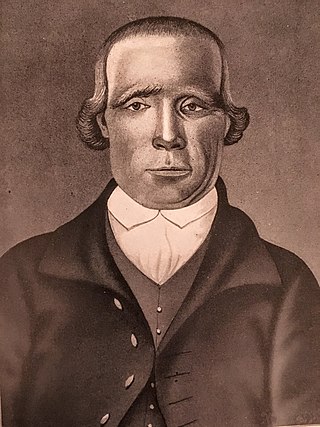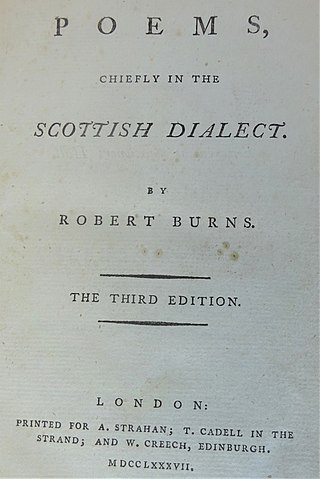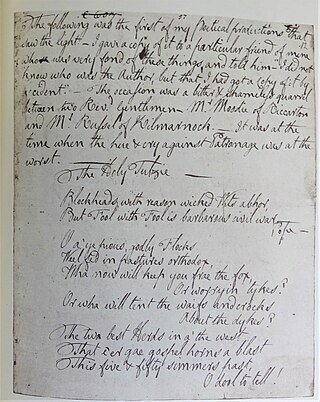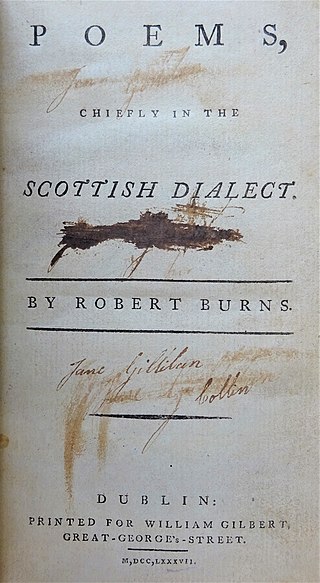"To a Mouse, on Turning Her Up in Her Nest With the Plough, November, 1785" is a Scots-language poem written by Robert Burns in 1785. It was included in the Kilmarnock volume and all of the poet's later editions, such as the Poems, Chiefly in the Scottish Dialect . According to legend, Burns was ploughing in the fields at his Mossgiel Farm and accidentally destroyed a mouse's nest, which it needed to survive the winter. In fact, Burns's brother, Gilbert, claimed that the poet composed the poem while still holding his plough.

Poems, Chiefly in the Scottish Dialect, commonly known as the Kilmarnock Edition, is a collection of poetry by the Scottish poet Robert Burns, first printed and issued by John Wilson of Kilmarnock on 31 July 1786. It was the first published edition of Burns' work. In mid-April 1786, Burns sent out printed Proposals for what was then titled Scotch Poems asking for people to sign up as subscribers, printing began on June 13, and the first copies were ready for distribution by July 31. 612 copies were printed. The book cost three shillings, in a temporary paper binding that most purchasers soon had replaced. There is no formal dedication at the start of the book, but Burns includes a dedication poem to Gavin Hamilton at pp. 185-191, and "The Cotter's Saturday Night" is "inscribed to R.A. Esq.," i.e. Robert Aitken.
Nationality words link to articles with information on the nation's poetry or literature.

Robert Burns, also known familiarly as Rabbie Burns, was a Scottish poet and lyricist. He is widely regarded as the national poet of Scotland and is celebrated worldwide. He is the best known of the poets who have written in the Scots language, although much of his writing is in a "light Scots dialect" of English, accessible to an audience beyond Scotland. He also wrote in standard English, and in these writings his political or civil commentary is often at its bluntest.

The Robert Burns World Federation is a literary society based in Kilmarnock, Ayrshire, Scotland, aimed at educating the public about the life, poetry and works of the poet Robert Burns. It is a Scottish Charity and a company limited by Guarantee. The Federation links existing Burns Clubs and similar groups, giving a unique number to affiliated Clubs, which is then used by them in their promotion and identification. Their ongoing intent is to provide a way for clubs to link together and enjoy the mutual benefit of association, communication and shared mission. It was founded in 1885

John Goldie, Goudie or Gowdie (1717–1811) the 'Philosopher' was a friend of the poet Robert Burns who was born the son of a miller at Craigmill on the Cessnock Water in East Ayrshire, Scotland. He was a miller, mechanic, cabinet maker, later a wine merchant and had interests ranging from the study of mathematics and astronomy to that of theology, publishing several books, in particular in 1780 the popular three volume Essays on various Important Subjects Moral and Divine, being an attempt to distinguish True from False Religion, a publication that became generally known as 'Goudie's Bible' and raised him to national prominence. The name 'John Goldie' will be used throughout for consistency.

Poems, Chiefly in the Scottish Dialect is commonly known as the first Edinburgh Edition and the partial second setting has become known as the Stinking Edition. It is a collection of poetry and songs by Robert Burns, first "Printed for the Author" by William Smellie in Edinburgh and published or "Sold by William Creech" of Edinburgh on the 17 April, an announcement being made in the Edinburgh Advertiser on that date, although the date 21 April 1786 is given by a few authors. The Kilmarnock Edition made Robert Burns Caledonia's Bard whilst the 'Edinburgh Edition' elevated him into a position amongst the world's greatest poets.

Poems is a collection of poetry and songs by David Sillar, a close friend of the poet Robert Burns who had been encouraged to go into print by the success of Poems, Chiefly in the Scottish Dialect. Poems was printed by John Wilson of Kilmarnock in 1789. Sillar's interest in poetry predated his friendship with Burns, but was one of several reasons for it.
Alexander Tait, Sawney Tait or Saunders Tait was a tailor, a published poet and also a contemporary of Robert Burns who he knew well. Tait was also well acquainted with the published poet and close friend of Burns, David Sillar. Sawney spent much of his life in Tarbolton where he was an active member of the community. His poems were exhibited in the 1896 Burn Exhibition, a copy being loaned by the Mitchell Library. Alexander was generally known locally as 'Whip-the-cat' an old expression that referred to itinerant tailors, etc. who went from door to door to do work for others.

Poems, Chiefly in the Scottish Dialect is commonly known as the Third or London Edition and sometimes the Stinking Edition. It is a collection of poetry and songs by Robert Burns, printed for A. Strahan; T. Cadell in the Strand; and W. Creech, Edinburgh. MDCCLXXXVII The date of publication for the London Edition was in November 1787, however Strahan and Cadell had previously advertised for sale the 'Second' or 'Edinburgh Edition' using the 500 or so copies that William Creech still had that were unsold. The successful selling of these made a truly new 'London Edition' a commercially viable enterprise.

The Glenriddell Manuscripts is an extensive collection written in holograph by Robert Burns and an amanuensis of his letters, poems and a few songs in two volumes produced for his then friend Captain Robert Riddell, Laird of what is now Friars Carse in the Nith Valley, Dumfries and Galloway. The two volumes of the manuscript were handsomely bound in calf leather. The first volume of poems and songs was completed by April 1791 and was presented to Robert Riddell, however their friendship ceased due to the unfortunate 'The Rape of the Sabine Women' incident and Robert Riddell died shortly after before any reconciliation could take place. The first volume is partly in Burns's hand with one main amanuensis contributing much of the text in a far neater hand than the author himself and a possible third person contributing to the text. The second volume is entirely in Burns's hand.

Duncan McNaught LL.D., J.P., was born in Alexandria, Dunbartonshire in 1845. He was the parochial school teacher at Kilmaurs in East Ayrshire from 1867 and served at the school for over fifty years, having served as assistant from 1865. He founded the Kilmarnock Conservative Association, jointly founded the Robert Burns World Federation, acted as the editor of the "Burns Chronicle" and was the president of what became the Robert Burns World Federation.

Poems, Chiefly in the Scottish Dialect was issued during the poet's lifetime In Two Volumes. The Second Edition Considerably Enlarged. It is a collection of poetry and songs by the poet Robert Burns, printed for T. Cadell, London, and W. Creech, Edinburgh. M,DCC,XCIII The date of publication for this edition was 16 February 1793 as advertised in the Edinburgh Courant. The successful demand for the 1787 Edinburgh Edition seems to have encouraged Creech to publish this new edition as the 1787 volume had been sold out since around 1791.

Robert Burns's Commonplace Book 1783–1785 is the first of three commonplace books that were produced by the poet. The contents cover drafts of songs and poems, observations, ideas, epitaphs, etc.

The Merry Muses of Caledonia is a collection of bawdy songs said to have been collected or written by Robert Burns, the 18th-century Scottish poet.

'Robert Burns's Interleaved Scots Musical Museum' or the 'Interleaved Glenriddell Manuscript' is a set of four octavo volumes of James Johnson's The Scots Musical Museum in which Robert Burns provided additional material to the original publication on interleaved sheets and which he eventually gifted to Captain Robert Riddell (1755–94) of Friars Carse, Dumfries and Galloway, Scotland.

'The Holy Tulzie', 'The Twa Herds' or 'An Unco Mournfu' Tale was a poem written in 1784 by Robert Burns whilst living at Mossgiel, Mauchline, about a strong disagreement, not on doctrine, but on the parish boundaries, between two 'Auld Licht' ministers, John Russel and Alexander Moodie It was followed by "The Holy Fair", "The Ordination", "The Kirk's Alarm", "Holy Willie's Prayer", etc.

James M'Kie or James McKie (1816–1891) was an apprentice of Hugh Crawford, John Wilson's successor at the Kilmarnock Cross printing business. In 1867, M'Kie published the first facsimile edition of the 1786 "Kilmarnock Edition" or Poems, Chiefly in the Scottish Dialect as well as various bibliographies, reprints, special editions, limited editions, etc. of Robert Burns' and other works for the Scottish, British, British Empire or North American markets. He became an avid collector of Burnsiana and put together the largest collection of published in the world at the time, that was eventually purchased by the local Kilmarnock Corporation and housed in the Kay Park Burns Museum.

The Geddes Burns is a copy of Robert Burns's 1787 Poems, Chiefly in the Scottish Dialect with twenty-seven extra pages with twelve poems and songs in Burns's handwriting bound in, and a letter to Catholic Bishop John Geddes from the poet, written at Ellisland Farm.

Poems, Chiefly in the Scottish Dialect was the second "pirated" issue of Robert Burns's work, being published in Ireland at Belfast without permission from or payment to the author or publisher. It is a so-called Stinking Edition, carrying the error Stinking for the Scots word Skinking (watery) in the poem "To a Haggis" because the type setters copied from a 1787 Stinking Edition of Poems, Chiefly in the Scottish Dialect. It has been shown to be from the same print setting as the Belfast Edition but with a different title page.




















